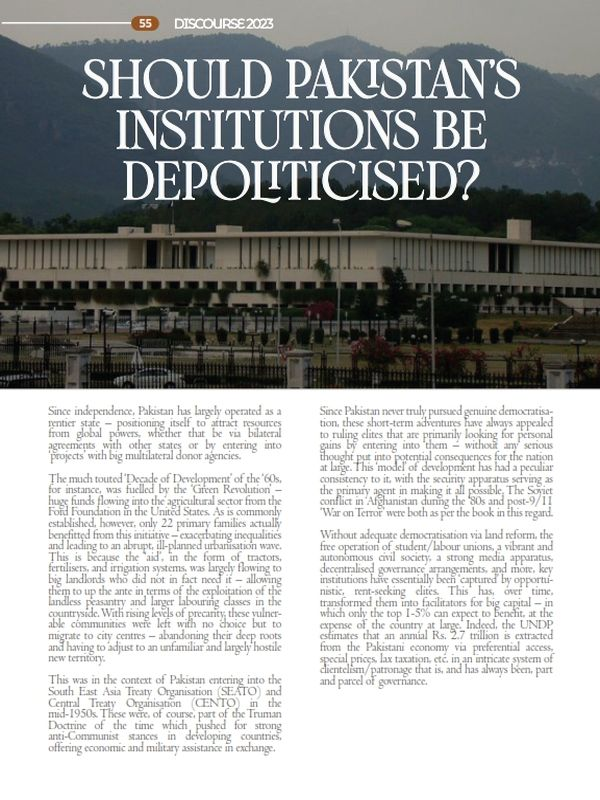Intro: Should Pakistan’s Institutions Be Depoliticised?
The Debate segment of Discourse seeks to initiate open, good-faith exchanges on ‘big picture’ questions of policy: in particular, ones that involve two consolidated ‘schools of thought’ that have each evolved in apparent isolation and become the antitheses of one another over time. This is due, of course, to ideology and the incentive structures of both media and academia – which are structured to foster the growth of echo chambers. Through this section of the magazine, the Pakistan Institute of Development Economics is attempting to lay out the two salience perspectives of a particular topic in a manner that centres our audience, allowing them to engage with both sides and arrive at their own conclusions.
Since independence, Pakistan has largely operated as a rentier state – positioning itself to attract resources from global powers, whether that be via bilateral agreements with other states or by entering into ‘projects’ with big multilateral donor agencies.
The much touted ‘Decade of Development’ of the ‘60s, for instance, was fuelled by the ‘Green Revolution’ – huge funds flowing into the agricultural sector from the Ford Foundation in the United States. As is commonly established, however, only 22 primary families actually benefitted from this initiative – exacerbating inequalities and leading to an abrupt, ill-planned urbanisation wave. This is because the ‘aid’, in the form of tractors, fertilisers, and irrigation systems, was largely flowing to big landlords who did not in fact need it – allowing them to up the ante in terms of the exploitation of the landless peasantry and larger labouring classes in the countryside. With rising levels of precarity, these vulnerable communities were left with no choice but to migrate to city centres – abandoning their deep roots and having to adjust to an unfamiliar and largely hostile new territory.
This was in the context of Pakistan entering into the South East Asia Treaty Organisation (SEATO) and Central Treaty Organisation (CENTO) in the mid-1950s. These were, of course, part of the Truman Doctrine of the time which pushed for strong anti-Communist stances in developing countries, offering economic and military assistance in exchange. Since Pakistan never truly pursued genuine democratisation, these short-term adventures have always appealed to ruling elites that are primarily looking for personal gains by entering into them – without any serious thought put into potential consequences for the nation at large. This ‘model’ of development has had a peculiar consistency to it, with the security apparatus serving as the primary agent in making it all possible. The Soviet conflict in Afghanistan during the ‘80s and post-9/11 ‘War on Terror’ were both as per the book in this regard.
Without adequate democratisation via land reform, the free operation of student/labour unions, a vibrant and autonomous civil society, a strong media apparatus, decentralised governance arrangements, and more, key institutions have essentially been ‘captured’ by opportunistic, rent-seeking elites. This has, over time, transformed them into facilitators for big capital – in which only the top 1-5% can expect to benefit, at the expense of the country at large. Indeed, the UNDP estimates that an annual Rs. 2.7 trillion is extracted from the Pakistani economy via preferential access, special prices, lax taxation, etc. in an intricate system of clientelism/patronage that is, and has always been, part and parcel of governance.
Elite capture as the root cause of Pakistan’s inability to progress and develop in a sustainable and inclusive manner is a fairly well established idea, and accepted across the political spectrum. Where there is disagreement, however, is the optimal strategy to correct it. One school of thought prioritises competence in this regard, arguing that those with ‘technical expertise’ in a clearly defined area – such as education, energy, finance, etc. – ought to be able to head ministries without the interference of ‘political’ forces. The other school argues that virtually all decisions that are taken in government are political in their nature, as they affect the lives of real people/communities as they disrupt power relations between/among them. Therefore, the appropriate course of action should instead be to pursue radical democratisation – which will set in motion the incentive for efficient/effective service delivery as ruling elites know that their prospects for returning to power for subsequent terms is directly correlated with their performance during the current one.
In sum, one perspective believes it is competence that will lay the foundations for reform – while the other believes that only real democracy, not only in letter but spirit, can lead to technically able individuals heading key roles within government. The former advocates for a separation between politics and economics, while the latter insists these are two sides of the same coin. In order to explore both positions in all their complexity, former Governor State Bank and Finance Minister of Punjab Mr. Shahid Kardar has posed a case for depoliticised institutions – whereas senior political activist/worker affiliated with the Awami Workers Party and Professor of Political Economy at the Quaid-i-Azam University Dr. Aasim Sajjad Akhtar has presented the opposition stance.
We hope this debate serves to highlight the strongest and weakest aspects of both positions, as well as underscoring the areas in which they may overlap: thus helping take the conversation forward while appreciating all the nuances that have made it such a ‘sticky’ issue for Pakistan.
Happy reading – and remember to keep the discourse alive!
Sincerely,
Editorial Board
Discourse Magazine
Pakistan Institute of Development Economics




